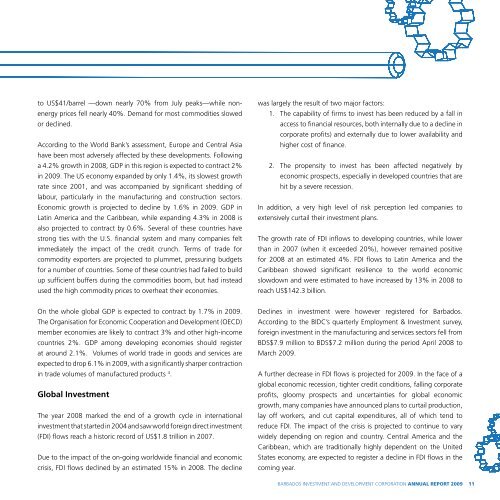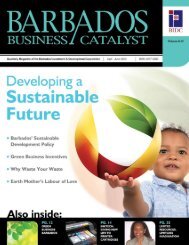Notes to Consolidated Financial Statements - Barbados Investment ...
Notes to Consolidated Financial Statements - Barbados Investment ...
Notes to Consolidated Financial Statements - Barbados Investment ...
You also want an ePaper? Increase the reach of your titles
YUMPU automatically turns print PDFs into web optimized ePapers that Google loves.
<strong>to</strong> US$41/barrel —down nearly 70% from July peaks—while nonenergy<br />
prices fell nearly 40%. Demand for most commodities slowed<br />
or declined.<br />
According <strong>to</strong> the World Bank’s assessment, Europe and Central Asia<br />
have been most adversely affected by these developments. Following<br />
a 4.2% growth in 2008, GDP in this region is expected <strong>to</strong> contract 2%<br />
in 2009. The US economy expanded by only 1.4%, its slowest growth<br />
rate since 2001, and was accompanied by significant shedding of<br />
labour, particularly in the manufacturing and construction sec<strong>to</strong>rs.<br />
Economic growth is projected <strong>to</strong> decline by 1.6% in 2009. GDP in<br />
Latin America and the Caribbean, while expanding 4.3% in 2008 is<br />
also projected <strong>to</strong> contract by 0.6%. Several of these countries have<br />
strong ties with the U.S. financial system and many companies felt<br />
immediately the impact of the credit crunch. Terms of trade for<br />
commodity exporters are projected <strong>to</strong> plummet, pressuring budgets<br />
for a number of countries. Some of these countries had failed <strong>to</strong> build<br />
up sufficient buffers during the commodities boom, but had instead<br />
used the high commodity prices <strong>to</strong> overheat their economies.<br />
was largely the result of two major fac<strong>to</strong>rs:<br />
1. The capability of firms <strong>to</strong> invest has been reduced by a fall in<br />
access <strong>to</strong> financial resources, both internally due <strong>to</strong> a decline in<br />
corporate profits) and externally due <strong>to</strong> lower availability and<br />
higher cost of finance.<br />
2. The propensity <strong>to</strong> invest has been affected negatively by<br />
economic prospects, especially in developed countries that are<br />
hit by a severe recession.<br />
In addition, a very high level of risk perception led companies <strong>to</strong><br />
extensively curtail their investment plans.<br />
The growth rate of FDI inflows <strong>to</strong> developing countries, while lower<br />
than in 2007 (when it exceeded 20%), however remained positive<br />
for 2008 at an estimated 4%. FDI flows <strong>to</strong> Latin America and the<br />
Caribbean showed significant resilience <strong>to</strong> the world economic<br />
slowdown and were estimated <strong>to</strong> have increased by 13% in 2008 <strong>to</strong><br />
reach US$142.3 billion.<br />
On the whole global GDP is expected <strong>to</strong> contract by 1.7% in 2009.<br />
The Organisation for Economic Cooperation and Development (OECD)<br />
member economies are likely <strong>to</strong> contract 3% and other high-income<br />
countries 2%. GDP among developing economies should register<br />
at around 2.1%. Volumes of world trade in goods and services are<br />
expected <strong>to</strong> drop 6.1% in 2009, with a significantly sharper contraction<br />
in trade volumes of manufactured products 4 .<br />
Global <strong>Investment</strong><br />
The year 2008 marked the end of a growth cycle in international<br />
investment that started in 2004 and saw world foreign direct investment<br />
(FDI) flows reach a his<strong>to</strong>ric record of US$1.8 trillion in 2007.<br />
Due <strong>to</strong> the impact of the on-going worldwide financial and economic<br />
crisis, FDI flows declined by an estimated 15% in 2008. The decline<br />
Declines in investment were however registered for <strong>Barbados</strong>.<br />
According <strong>to</strong> the BIDC’s quarterly Employment & <strong>Investment</strong> survey,<br />
foreign investment in the manufacturing and services sec<strong>to</strong>rs fell from<br />
BDS$7.9 million <strong>to</strong> BDS$7.2 million during the period April 2008 <strong>to</strong><br />
March 2009.<br />
A further decrease in FDI flows is projected for 2009. In the face of a<br />
global economic recession, tighter credit conditions, falling corporate<br />
profits, gloomy prospects and uncertainties for global economic<br />
growth, many companies have announced plans <strong>to</strong> curtail production,<br />
lay off workers, and cut capital expenditures, all of which tend <strong>to</strong><br />
reduce FDI. The impact of the crisis is projected <strong>to</strong> continue <strong>to</strong> vary<br />
widely depending on region and country. Central America and the<br />
Caribbean, which are traditionally highly dependent on the United<br />
States economy, are expected <strong>to</strong> register a decline in FDI flows in the<br />
coming year.<br />
BARBADOS INVESTMENT AND DEVELOPMENT CORPORATION ANNUAL REPORT 2009 11









